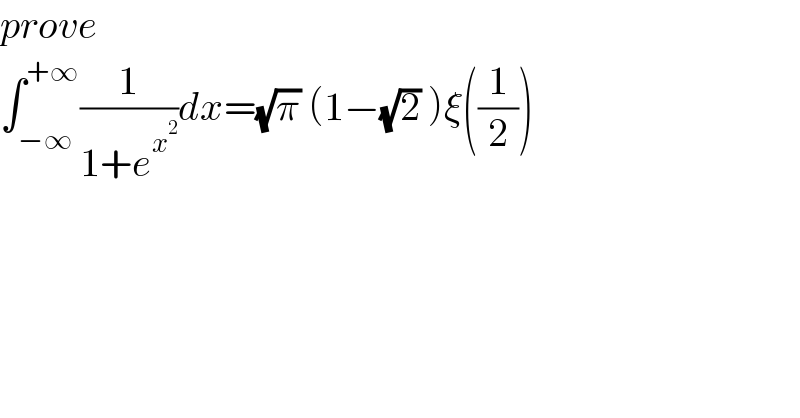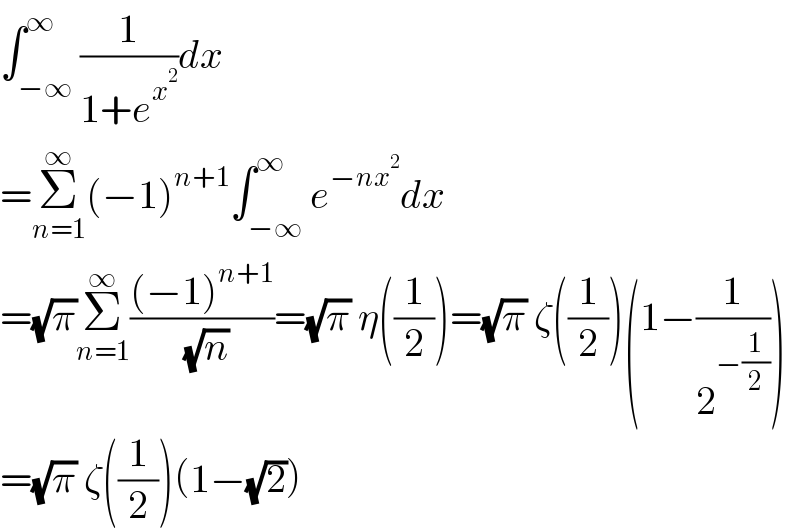
Question Number 129763 by Eric002 last updated on 18/Jan/21

$${prove} \\ $$$$\int_{−\infty} ^{+\infty} \frac{\mathrm{1}}{\mathrm{1}+{e}^{{x}^{\mathrm{2}} } }{dx}=\sqrt{\pi}\:\left(\mathrm{1}−\sqrt{\mathrm{2}}\:\right)\xi\left(\frac{\mathrm{1}}{\mathrm{2}}\right) \\ $$
Answered by Dwaipayan Shikari last updated on 18/Jan/21

$$\int_{−\infty} ^{\infty} \frac{\mathrm{1}}{\mathrm{1}+{e}^{{x}^{\mathrm{2}} } }{dx} \\ $$$$=\underset{{n}=\mathrm{1}} {\overset{\infty} {\sum}}\left(−\mathrm{1}\right)^{{n}+\mathrm{1}} \int_{−\infty} ^{\infty} {e}^{−{nx}^{\mathrm{2}} } {dx} \\ $$$$=\sqrt{\pi}\underset{{n}=\mathrm{1}} {\overset{\infty} {\sum}}\frac{\left(−\mathrm{1}\right)^{{n}+\mathrm{1}} }{\:\sqrt{{n}}}=\sqrt{\pi}\:\eta\left(\frac{\mathrm{1}}{\mathrm{2}}\right)=\sqrt{\pi}\:\zeta\left(\frac{\mathrm{1}}{\mathrm{2}}\right)\left(\mathrm{1}−\frac{\mathrm{1}}{\mathrm{2}^{−\frac{\mathrm{1}}{\mathrm{2}}} }\right) \\ $$$$=\sqrt{\pi}\:\zeta\left(\frac{\mathrm{1}}{\mathrm{2}}\right)\left(\mathrm{1}−\sqrt{\mathrm{2}}\right) \\ $$
Commented by Eric002 last updated on 18/Jan/21

$${well}\:{done}\: \\ $$
Answered by mnjuly1970 last updated on 18/Jan/21

$$\phi=\mathrm{2}\int_{\mathrm{0}} ^{\:\infty} \frac{\mathrm{1}}{\mathrm{1}+{e}^{{x}^{\mathrm{2}} } }{dx}\overset{{x}^{\mathrm{2}} ={t}} {=}\int_{\mathrm{0}} ^{\:\infty} \frac{{dt}}{\:\sqrt{{t}}\:\left(\mathrm{1}+{e}^{{t}} \right)} \\ $$$$\:=\int_{\mathrm{0}\:\:} ^{\:\infty} \frac{{t}^{\frac{\mathrm{1}}{\mathrm{2}}\:−\mathrm{1}} }{\mathrm{1}+{e}^{{t}} }\:=\Gamma\left({s}\right).\eta\left({s}\right)\: \\ $$$$\:\:\:{where}\:\:\Gamma\:{and}\:\:\eta\:{are}\:{Euler}\:\:{gamma}\:{and} \\ $$$$\:\:\:{Drichlet}\:{etafunctions}\:{respectively}.\:\: \\ $$$$\therefore\:\phi\:=\:\Gamma\left(\frac{\mathrm{1}}{\mathrm{2}}\right)\eta\left(\frac{\mathrm{1}}{\mathrm{2}}\right) \\ $$$$\:\:\:\:\:\:\:\:\:=\:\Gamma\left(\frac{\mathrm{1}}{\mathrm{2}}\right)\left(\mathrm{1}−\mathrm{2}^{\mathrm{1}−\frac{\mathrm{1}}{\mathrm{2}}} \right)\zeta\left(\frac{\mathrm{1}}{\mathrm{2}}\right) \\ $$$$\:\:\:\:\:\:\:\:\:\:\:=\:\:\:\sqrt{\pi\:}\:\left(\mathrm{1}−\sqrt{\mathrm{2}\:}\:\right)\zeta\left(\frac{\mathrm{1}}{\mathrm{2}}\right)... \\ $$$$ \\ $$$$\: \\ $$
